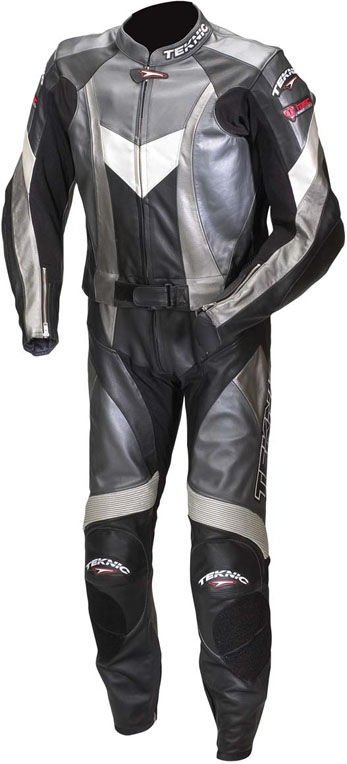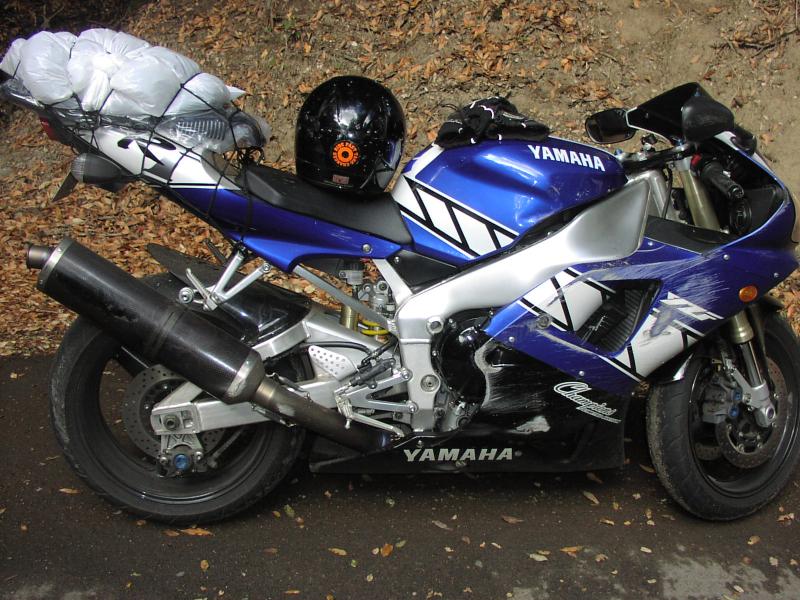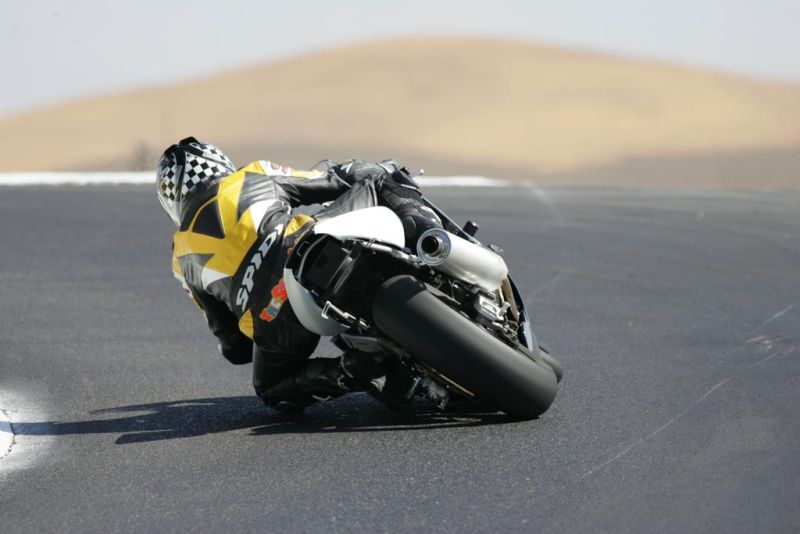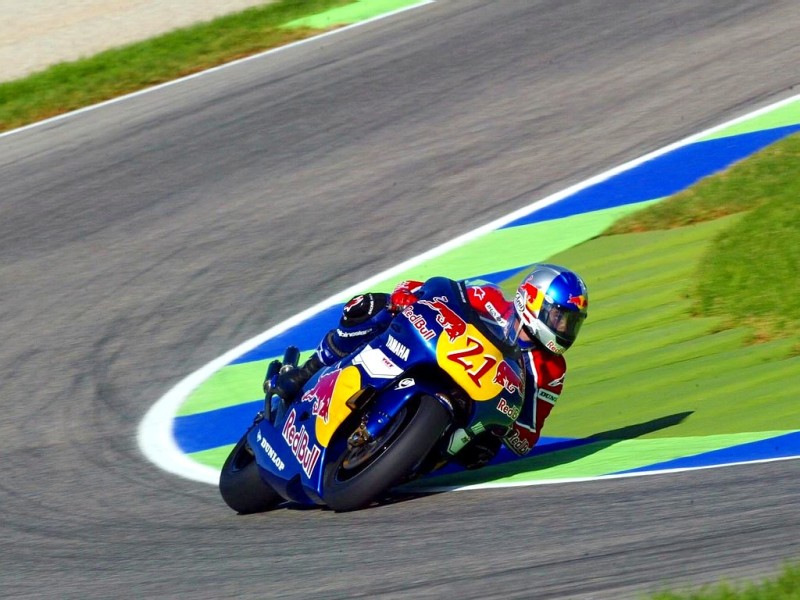Submitted by florin on
This is part 2 in the motorcycles series, and the follow-up to my essay "The engines of joy" which has been published here:
http://florin.myip.org/blog/node/22
This time I will examine the same themes, but from a different perspective.
It was a quiet Saturday morning in October when I woke up to prepare for the week-end ride. Everyone else was still sleeping and the silence was quite eerie, in stark contrast with what was about to come. I finished breakfast quickly, it was time to put on my gear.
I always loved this part. Looking at the bulky leather costume, armored and padded with shock-absorbing material, it seemed impossible that anyone could wear such a thing for hours and still be able to control the motorcycle with any precision whatsoever.

And yet, once everything was on - suit, boots (tall, armored, gripping the foot in some sort of articulated exoskeleton), gloves and all, my body always felt that it all made sense. Sure, it would have been impossible to perform acrobatics thusly dressed, but acrobatics wasn't on the schedule after all. The big and rigid "armor" was made to give the body just enough freedom to steer the bike, and it seemed like it could just barely wait to begin doing what was supposed to do. "Hurry up, get on the bike, start riding!"
No problem, I smiled. No problem.
I went outside, to the parking lot, and pushed the bike out from under the shed. It was rather cold that morning, a sky the color of steel was threatening rain. Not if the weather forecast is right, I mumbled, frowning at the uniform gray layer above.
I started the engine, to give it plenty of time to warm up thoroughly - after all, it was pretty soon going to do 10,000 RPM or more. While the engine was doing its thing, I started to inspect the bike - tires, brake fluid, chain, etc. At the same time, my mental preparation, already under way since the moment I woke up, was supposed to put the final touches.
But the mind is a strange thing. While moving the bike a couple feet to verify the tires over the entire circumference, all the while shooting quick glances at the heavy sky, my memory sort of went into random mode.
I remembered the ride two weeks before. It was a day just like this one, a bit cold, the trees, the grass and the roads heavy with dew, which made riding fairly difficult, since the traction available to the tire on a wet road is a lot less than the ideal traction in dry conditions. I was with a group of experienced people, most of them better riders than myself. The leader was known for his constant emphasis on safety, which made his rides a lot less "eventful" than most.
Not that day. We lost a rider only a few minutes after we took off. It was someone fairly new to riding sportbikes, on a very powerful, shiny new 1000cc Suzuki GSXR. He lost traction in a right-hand turn, fell down and went sliding all the way across the road, until both rider and bike stopped abruptly into the guard rail. Fortunately, the gear did its job and the rider only suffered a few bruises and a sprained thumb. The bike was less fortunate, last I've heard it was declared a total loss.
The police and the tow truck made a quick appearance, and once the fallen rider was in good hands, we kind of shrugged and continued the ride.
And then it happened again. This time, it was the leader who was deceived by a camouflaged pothole in the road, looking just like a wet patch on the asphalt. Wet it was, for sure, but not asphalt. And this guy, who hadn't dropped the bike even once in like 15 years, lost control and fell down. Another rider, following close behind, fell into the same trap and dropped the bike.
Fortunately, the biggest injury sustained by both riders was their damaged pride. The bikes were bruised and scratched, but still ridable.

Bad luck, I said to myself, brushing the memory away, while checking whether the chain was properly lubed. But then I remembered something else.
For some reason, I did not participate to that ride, but I learned what happened while reading the discussions afterwards on the website.
It was, again, a group of experienced riders, tackling the difficult roads in the mountains in less than ideal weather. The roads, again, were wet, so they adjusted their speed for safety. Apparently, they did not adjust it enough.
It was a fairly easy turn, and almost the entire group made it through without problems. The rider before last was going just as fast as everyone else. His bike was by no means less capable, the tires in good condition. Yet, somehow, he lost traction, fell down and started to slide.
The rider stopped from sliding fairly soon, but the bike did not. There was a car parked on the other side of the road and the bike went straight in that direction. It wedged itself under the car, the gas tank probably broke, and the high-octane is like it's looking for the slightest pretext to catch on fire. It was only a matter of minutes before the car's gas tank became hot enough, and the rest is easy to imagine.
Both vehicles were completely destroyed. Again, fortunately, nobody was hurt.
Way to go, dude, I said to myself, that's a wonderful thing to think of before the ride. Yet somehow, the thought to turn around, go home and don't do the Saturday ride did not cross my mind. Not at all.
And that seems impossible to understand, but it becomes pretty clear if you think that everything in life is a trade. You give something to obtain something else. You give small things to obtain the cheap stuff. You give a lot to obtain the big prize. It is like that, just like that, with riding. What you are ready to give, what you put on the table as you're playing your hand, is obvious, since this is an extreme sport, and the safety of the participants is never guaranteed.
But I guess it's much less obvious what is the coveted big prize here, at least for someone who doesn't have this experience. For the riders, this should be rather trivial, but I'm speaking here to everyone else.
Skydiving is not something that everyone experienced, but I think it's a pretty good comparison and a much better way to make things clear.
You board the plane, you take off, and wait until you reach the proper altitude. You make sure the parachute is safely strapped to your back, then open the door and stand next to the void. Up until then, you can still make a decision. You may choose to go back, and that determines a whole chain of events - you sit down, the plane descends slowly and makes a safe landing. Or you may choose to step forward, and an entirely different set of virtual futures is made real and concrete.
Either way, you can still decide. And because of that, you can either muster up courage, or give in to fear. Both are still possible, and it's the fact that you can still make a choice that enables both. The decision tree is still a tree, big, thick and full.
And then you step into the void.
In that very moment, all choices disappear. As you start picking up speed in free fall, quickly approaching the terminal velocity, the earth growing bigger and bigger, there are no decisions to be made. There can be no either left or right or straight ahead. You are not in the labyrinth anymore. Instead, there's only one big groove and you're rolling down like a bowling ball. The decision tree has been stripped of all its branches, it's just a naked vertical pole. There's only one thing you have to do - you have to pull the cord to open the parachute, and that is not really a decision, it's pretty much mandatory.
Same with motorcycle riding.
You approach a turn at a pretty big speed. It's not faster than the maximum speed that allows you to tackle that turn. But it's not slower either. You choose the trajectory, position yourself in the lane so as to begin the turn in the best way. And then you start leaning the bike. Once you're in, there aren't that many choices to make.

You can't "decide" to not lean the bike that much - if you straighten it up, you'll take a wide turn and fly off the road. You can't "decide" to lean more either, because you are already leaning it as much as possible - any more leaning and the bike may lose traction, slide sideways and fall down. Both choices may bring a rather nasty outcome, so they're not really choices.
And then something wonderful happens.
Since it becomes pretty much useless, your mind shuts down. The mind is there to analyze, to doubt, compare and make choices. But you're following the unique line that can carry you through the turn at that speed, it cannot be improved upon, so there can be no choice, there can be no doubt. You just have to do it. And since you cannot go back, but only follow through, fear disappears.
Fear exists only as long as doubt is possible, only as long as you can make a choice. But with the decision tree stripped of all its branches, with the rational mind turned off and silent, fear vanishes. After all, you are doing the only thing that you can do at that moment, it's not like you can do either X or Y or Z - it's X all the way, or you become part of the landscape.

The decision tree is the place where fear hides, and the rational mind is the one who's watering the roots. Cut the tree down and banish its caretaker, and fear is gone.
This is, after all, the big prize. This is the thing that asks you to put everything on the table and play your hand. You're doing something that normally would make you scream in horror, yet you don't feel fear at all. Actually, the riders know but everyone else is probably not aware of this - when you're riding a motorcycle at high speed through a tight turn you're most likely to smile like you're in Paradise - and maybe you are, since you're pretty much exceeding this mockery, this miserable "human nature", at least temporarily, and live free, a life made true by its own intensity.
--
That cloudy October morning, I was still thinking of the other two Saturday rides that ended up pretty bad. I finished checking the bike, so I put the helmet on, then the gloves. Swinging my leg over the bike, I sat in the saddle and grabbed the handlebars. For a while, I was motionless, just looking at the grey sky. To the East, the hills were waiting, the place where I was going to meet the other riders. It was not raining, but the air was humid and cold. It was an empty moment, void of action, but not a wait either.
But then I squeezed the throttle, and the engine came alive from its slumber. It started to sing its high-RPM song of power, the melody going up and down following the motion of my right hand. It was that sound that sent waves of electric joy through my nerves, it was that power that washed away all memories, good and bad. And the hills were not waiting anymore, I could feel them calling.
"I am coming", I said. "I am coming."
I released the clutch and the bike jumped forward. I rode off under the steely sky, carrying the Sun within. The hills were calling, and I was not going to let them wait.

Read part three, "The quest for intensity", here:
